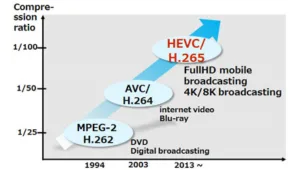HEVC Advance announced that it will be offering essential HEVC patents to potential users this year. The company will officially open in the third quarter of 2015, with pricing being announced in the second quarter. The new company said: “Utilizing a balanced business model for HEVC IP commercialization, HEVC Advance will provide an efficient and transparent means for accessing and licensing HEVC essential patents. HEVC Advance expects to attract a critical mass of intellectual property (IP) holders, with more than 500 essential patents expected to be available for license at launch, with the number of patents expected to grow significantly”.
This creates a second patent pool that is in competition with MPEG LA, the patent pool founded to promote the deployment of H.264. While MPEG LA has already announced the license fee structure for HEVC licensees, the new development muddies the waters of HEVC deployment and the move has been surprising for most observers of the industry.
Source: NEC
While HEVC is an important part of the deployment of streaming video and UHD/4K, everyone expected that this will go through the same channel as H.264. MPEG LA was providing a single licensing platform for all potential users H.264, which was developed to accelerate the deployment of H.264 in the industry. Interestingly, some analysts see patent pools as a potential factor for higher prices. It would appear that competition does not always create better terms for the users.
Several analysts interpret this development as a sign that not all licensors are happy with the results and development in the MPEG LA patent pool. From an outside perspective MPEG LA is much more advanced in the HEVC race, with a large number of licensors already announced and event license fees published. The following list shows the current licensors in the HEVC program:
- Apple Inc.
- Electronics and Telecommunications Research Institute (ETRI)
- Fujitsu Limited
- Hitachi Maxell, Ltd.
- HUMAX Holdings Co., Ltd.
- IBEX PT Holdings
- Industry – Academy Cooperation Foundation of Sejong University
- Intellectual Discovery Co., LTD.
- JVC KENWOOD Corporation
- Korea Advanced Institute of Science and Technology (KAIST)
- Korean Broadcasting System (KBS)
- KT Corp.
- Kwangwoon University Industry – Academic Collaboration Foundation
- M&K Holdings Inc.
- NEC Corporation
- NEWRACOM, Inc.
- Nippon Hoso Kyokai (NHK)
- Nippon Telegraph and Telephone Corporation (NTT)
- NTT DOCOMO, INC.
- Orange SA
- Samsung Electronics Co., Ltd.
- Siemens Corp.
- SK Telecom
- Tagivan II, LLC
- The Trustees of Columbia University in the City of New York
- University – Industry Cooperation Group of Kyung Hee University
- Vidyo, Inc.
On the other hand HEVC Advance mentions so far GE, Technicolor, Dolby, Philips and Mitsubishi Electric. As you can see, none of these companies is part of the MPEG LA licensor pool. Since HEVC Advance has not published their initial patent portfolio it is impossible to see how much these overlap. It is also not clear if and how this new pool will interact with existing patent pools.
Analyst Comment
From a consumer standpoint competition is normally a good thing, however in this case it could delay the deployment of HEVC technology and subsequently raise the cost for streaming services and even UHD/4K services. The question is how important the patents in the HEVC patent pool are? Are they additional to what MPEG LA is offering or are the patents in direct competition to other existing patents? Will we see a lengthy and costly patent dispute ensuing from competing patents? All these questions can only be answered after the new group puts its cards on the table.
So far it seems that this development does indeed brings more uncertainty to the market players. Uncertainty is always a bad thing when it comes to the introduction of new technology. – NH
We heard the V-Nova story about a new codec, claimed to be better than HEVC, and apparently available from a single source, might be given an extra helping hand by this split. (BR)

